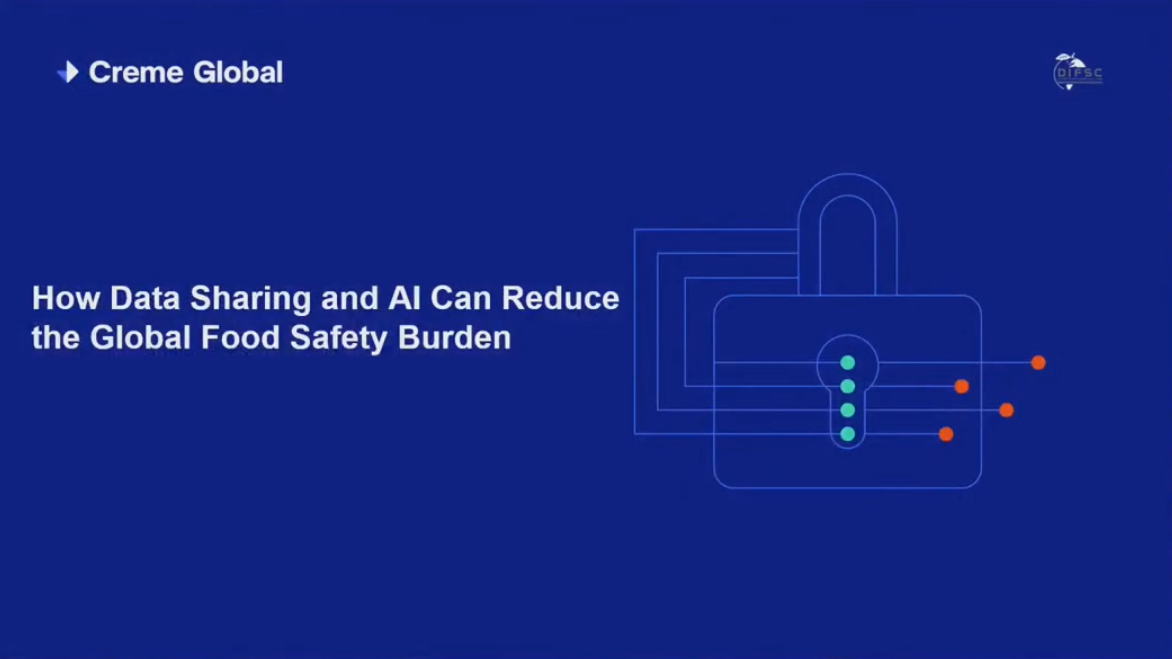Dr. James Doyle, Director of Global Accounts at Creme Global, attended the renowned 14th Annual Food Safety Symposium hosted by Maple Leaf Foods. This premier event brought together leaders in food safety and quality from across the industry, offering a platform to discuss advancements, challenges, and future trends in food safety. Held under the theme of AI’s transformative role in food safety, the symposium covered topics from data-driven decision-making to predictive analytics in maintaining food quality.
Dr. Doyle, alongside Conor Cahill, Head of Science & Innovation at Dawn Farms, also gave a joint presentation, adding valuable insights on the evolving landscape of food safety. Case study examples presented by Dawn Farms Foods highlighted a machine learning (ML) solution to revolutionize the food product development process with PeRCEPTION. PeRCEPTION utilizes AI to digitalize human sensory responses, enhancing new product development (NPD) without compromising food safety.
“AI and food safety are deeply intertwined, with AI transforming our business in ways we are only beginning to understand,” said Curtis Frank, President and CEO of Maple Leaf Foods.
Key highlights and takeaways from the event:
Using AI to Drive Business Value
The symposium emphasized how AI is creating tangible business value in the food industry. By automating processes and enabling data-driven decision-making, AI helps companies improve efficiency, enhance safety standards, and meet consumer demands more effectively.
The Importance of Data Quality and Precision
Precise data acquisition and data quality are foundational to leveraging AI effectively. Speakers highlighted how accurate, high-quality data improves AI model performance, leading to better insights and more reliable safety measures.
“Food safety data is plentiful in food manufacturing organizations, and the key to unlocking the value of AI is to have access to clean data that is related to the most critical food safety problems,” said Dr. Randy Huffman, Chief Food Safety and Sustainability Officer, Maple Leaf Foods.
Automated Quality and Safety Inspection
AI-driven quality and safety inspection technology has made strides, enabling faster, more accurate inspections that reduce human error. James noted that automation is transforming traditional quality assurance processes, making them more efficient and reliable.
Predictive Data Analytics for Food Recalls
One of the standout discussions involved data analytics for predicting food recalls. AI can analyze trends and detect early signs of potential issues, helping businesses adopt preventive measures and industry best practices to reduce recall risks.
Responsible AI Integration
Responsible integration of AI was a recurring theme. The symposium underscored the need for ethical considerations, transparency, and robust governance when deploying AI, ensuring it’s harnessed safely and to its fullest potential.
“Ensuring that data is trustworthy is paramount, as AI models will not fix bad data, only competent employees and well-designed processes ensure data integrity.” said Dr. Randy Huffman
Enhancing Sustainability and Consumer Safety
Beyond business value, AI enhances sustainability by reducing food waste, optimizing resource use, and supporting environmentally friendly practices. The technology also bolsters consumer safety by minimizing contamination risks, enhancing traceability, and ensuring rigorous safety protocols.
“The promise of AI is great, but we need to invest wisely and leverage the right technologies to enhance our food safety standards and drive long-term growth.” said Andreas Liris, Chief Technology & Information Officer, Maple Leaf Foods.
Collaboration and data sharing:
James and Conor’s partnership exemplifies how collaboration can amplify the impact of AI solutions in food science. By combining expertise from Creme Global and Dawn Farms, the team has created an ML solution that empowers food developers to respond more effectively to consumer trends while upholding rigorous safety standards.
The 14th Annual Food Safety Symposium reaffirmed the importance of technology and collaboration in ensuring safer, higher-quality food for consumers worldwide. Dr. Doyle’s participation underscored Creme Global’s commitment to driving innovation in food safety, offering solutions that empower the industry to confidently move forward.



